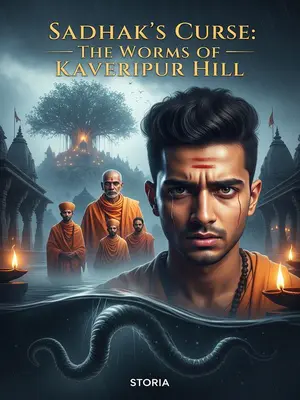Chapter 1: Into the World of Cultivation
After the board exams ended, I never expected my life to flip upside down, yet here I was—thrust into a world of spiritual cultivation.
The sticky stuffiness of the exam hall clung to me, the sharp tang of ink and sweat from a thousand anxious students still lingering in my nose. In a heartbeat, that vanished. Suddenly, I stood in a world that felt like a lost Amar Chitra Katha comic—except the heroes here were sadhaks, not kings. I blinked, struggling to make sense of it. I pinched my arm, half-expecting to wake up to Ma yelling about missing the school bus.
During the sect competition, our eldest senior brother lost because he couldn't answer what 4×8÷2−3 was. The panic on his face was unmistakable—like being called out to recite the full form of DNA at assembly. The elders shook their heads, and the crowd’s whispers sounded suspiciously like, “Arrey, tables bhi nahi aata hai isko?”
Second senior didi was regretfully eliminated because she couldn't understand the question, “What’s your name?” She stood there, braid loosening and fingers twisting her dupatta with nervous energy, every bit the student snapped from daydreams by a teacher’s sharp voice.
Third senior bhaiya was gravely injured because he couldn’t recite the next line after, “When the gulmohar petals fall, the koel cries.” The audience fell silent, a hush like after a child falters at school recitation. Even the crows on the ashram’s neem tree seemed to pause, waiting for the next line.
Later, I learned that here, everyone’s spiritual roots were Hindi, Maths, English, Physics, Chemistry, and Biology. The realization hit me like discovering my tuition teacher was also the local astrologer—completely upside down.
I was utterly bewildered, as lost as if I’d walked into the wrong tuition batch—Commerce instead of Science. My inner voice screamed, ‘Aree bhai, yeh kaunsi duniya hai?’
Your cultivation methods... seem a bit off, don’t they? I wanted to shout, ‘Mathematics ka table yaad nahi, toh kya fayda yeh saari tapasya ka?’ But I just shook my head, like an aunty reacting to a particularly absurd Saas-Bahu serial.
1.
The day after the board exams, I opened my eyes—
A faint whiff of agarbatti floated through the air, tangled with the low hum of early morning bhajans. Where my ceiling fan should’ve been, there was only the thatched roof of a small ashram. I stared, confusion twisting my insides. Was this some wild post-exam dream?
The sounds were all wrong—temple bells in the distance, crows cawing, the soft slap of chappals on mud. After a brief headache, memories not my own flooded my mind. A sharp pain pulsed at my temples, and then, like a Hindi film flashback, faces, names, and places swirled together like sugar in hot chai.
My name is Riya Sharma. My parents died when I was young, so I grew up an orphan. Like the girls from small towns whose parents called every Sunday evening, except my phone never rang. My hostel was an ashram, and my parents’ absence was forever. But in that emptiness, a quiet strength took root—a resilience I’d seen in countless Indian daughters, carrying the world without a word.
At sixteen, the third senior bhaiya from Anandam Ashram took pity on me and begged Guruji to make an exception, accepting me as an outer disciple. I remembered that first day—clutching my faded cloth bag, feeling lost. Amit bhaiya came to my rescue, splitting his roti and flashing a smile that said, ‘Don’t worry, sab theek ho jayega.’
My job? Sweep floors and run errands. Each morning before sunrise, I swept the red-oxide floors, scrubbed copper lotas, and made sure the diya at the shrine always burned. If elders called for tea, I ran with a steel glass, praying not to spill a drop.
Though called an “outer disciple,” Anandam Ashram had only five people. Not exactly Hogwarts, I thought. It was less a grand gurukul and more a family clinging to hope. Sometimes, the silence pressed in, as if even the ashram waited for a miracle.
But Guruji said my aptitude was poor, that I was fated to have no destiny with cultivation. His voice was always calm, never harsh, but every word landed like a judge’s gavel. Yet, sometimes I caught him watching me with a flicker of hope, as if some part of him still believed in miracles.
The day I arrived here just happened to be the grand Moksha Mahotsav among the ashrams of the Nine Regions. Like a local school’s annual sports day, but on a much grander scale. Banners flapped, the air buzzed with anticipation, and you could almost smell samosas and chai from distant stalls.
Every five years, all the ashrams gather and send their best disciples to compete—a spectacle like the KBC finals, with more spiritual pressure and less prize money. If you stand out, you might enter the Moksha Realm, with its legendary treasures and opportunities. Stories of the Moksha Realm floated through the ashram like gossip—everyone knew someone who knew someone who had come back changed.
So, every Moksha Mahotsav drew crowds from every corner, big and small. It was the only event big enough to get even the most reclusive guru to don a fresh kurta and polish his sandals. People braved dust and heat, just for a glimpse of greatness.
Three days ago, I followed Guruji and my seniors, travelling hundreds of kilometres to Shantipath Ashram—the biggest in the Nine Regions, with wise gurus as numerous as stars. It made our ashram look like a forgotten postage stamp in an old album. We crammed into a rattling old jeep, radio stuck on Lata Mangeshkar songs, clothes wrinkled, but spirits high with hope.
Guruji’s only expectation: win just one match. He patted our shoulders, eyes gentle. “Beta, bas ek jeet le aana. Zyaada kuch nahi chahiye.” The bar was low, but somehow, that made it more heartbreaking.
As a transmigrator with no talent, I just wanted to witness the brilliance of these geniuses. My notebook was ready; I was determined to be the most attentive audience member there.
But after the first match, all my anticipation crumbled. The image of spiritual heroes shattered—I stood there, mouth open, feeling like I’d stumbled into a classroom where the teachers were learning from the students.





